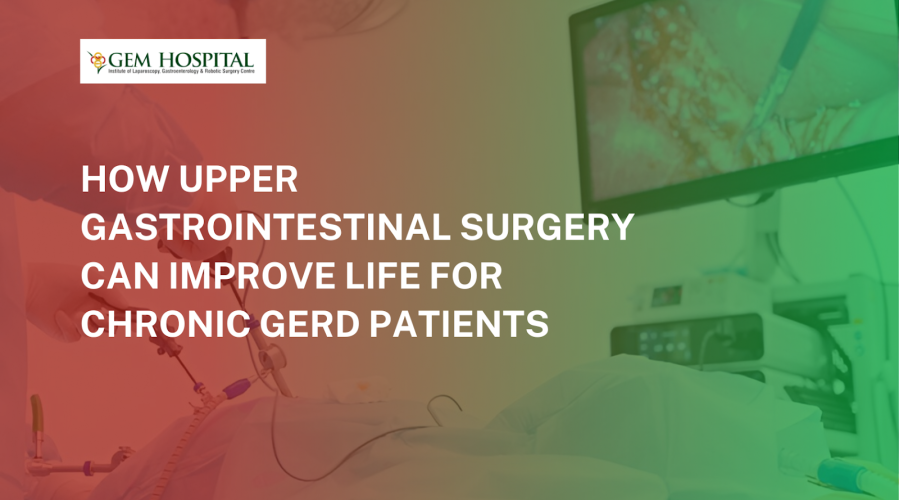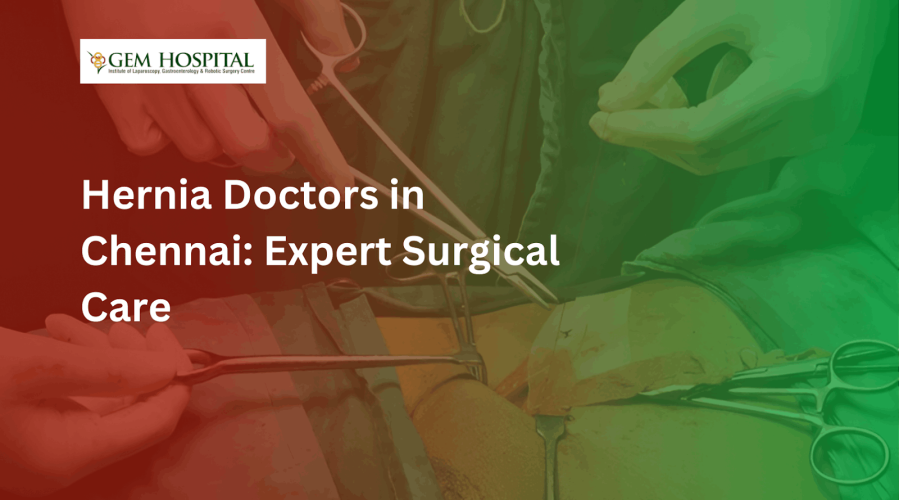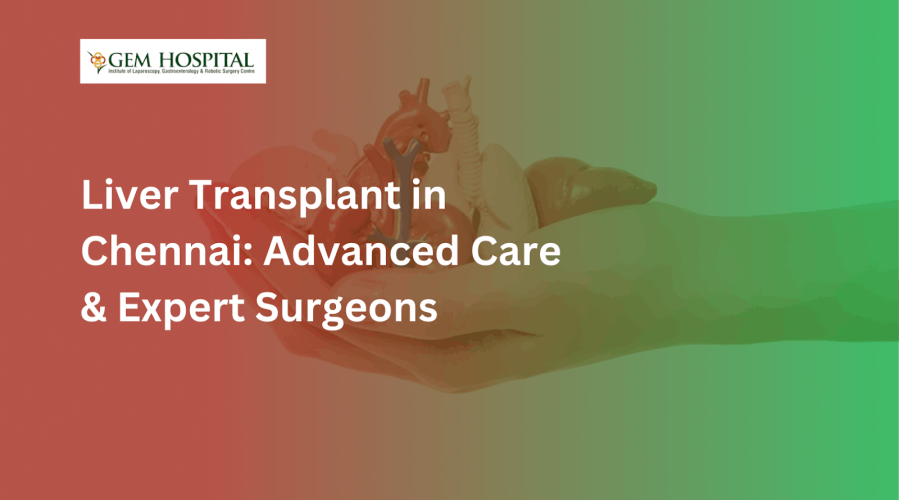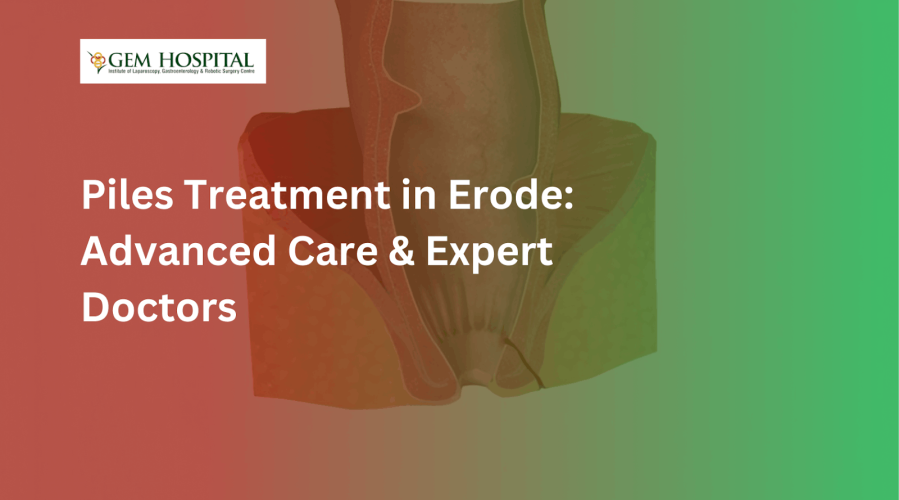Consult experienced hernia doctors in Chennai for expert surgical care. Advanced diagnosis, safe hernia surgery, and faster recovery with specialized treatment.
How Upper Gastrointestinal Surgery Can Improve Life for Chronic GERD Patients

Dealing with chronic GERD (gastroesophageal reflux disease) can feel like a never-ending cycle of discomfort. The burning. The bitter taste. The sleepless nights. All of the discomfort becomes commonplace. For many people, their discomfort improves with lifestyle changes and medication. But what happens when it does not improve and you are still in pain?
This is where Upper GI Surgery for GERD comes into play, not just as a last resort, but as a way to change the future of an individual and improve their quality of life.
Understanding GERD: More Than Just Heartburn
GERD happens when acid from the stomach comes back into the esophagus, this causes irritation to the esophagus. If reflux is chronic, it can injure the lining of the esophagus and lead to significant complications including:
- Esophagitis (inflammation)
- Barrett’s Esophagus (a precancerous condition)
- Strictures (narrowing of the esophagus)
- Chronic coughing or throat problems
While episodic reflux is common, chronic GERD interrupts daily life. When medications - antacids, H2 blockers, and PPIs, can no longer manage symptoms, surgery must be evaluated.
What Is Upper Gastrointestinal Surgery for GERD?
Upper GI surgery for GERD is focused on correcting the underlying anatomical cause of acid reflux, a weakened or malfunctioning lower esophageal sphincter (LES). The LES is a valve that separates the esophagus and the stomach. When the LE does not close properly, acid can move up.
Surgical treatment strengthens or rebuilds this valve mechanism. The most common procedures include:
1. Laparoscopic Nissen Fundoplication
This minimally invasive technique wraps the fundus (the upper part of the stomach) around the lower esophagus to strengthen the lower esophageal sphincter (LES). It is extremely effective, and it is the gold standard for GERD surgery.
2. LINX Procedure
A recent strategy is to place a ring of small magnetic beads around the LES. The magnets provide strength to the valve but allow food to pass without obstruction. This latter procedure is less invasive and reversible.
3. Hiatal Hernia Repair
For many GERD patients, they also have a hiatal hernia, which is where a portion of the stomach has pushed into the chest through the diaphragm. Hiatal hernia repairs often accompany reflux surgery.
Benefits of GERD Surgery: Beyond Symptom Relief
Choosing upper gastrointestinal surgery for GERD is not necessarily about stopping heartburn it's about functional improvement and reducing long-term health consequences.
Here's what patients frequently report after excellent surgery:
Complete or Near-Complete Symptom Relief
Almost all patients will have a considerable decrease in heartburn, regurgitation, and throat discomfort.
Reduced Dependence on Medications
Long-term use of PPIs (proton pump inhibitors) has been associated with nutrient deficiency, kidney disease, and other risks. Surgery allows many patients to stop or substantially decrease their medication consumption.
Better Sleep and Energy
Reflux can be worse at night, resulting in lack of sleep. After surgery, many patients will report improved sleep, which will lead them to feel more awake and mentally aware during the day.
Protection Against Long-Term Complications
By preventing reflux surgery has the potential to protect against both damage to the esophagus and esophageal strictures as well as decrease risk of esophageal cancer.
Improved Quality of Life
Those who suffer from chronic GERD often employ restrictive diets, place limits on activities, and socially isolate themselves.
Is Surgery Right for You?
Not everyone with GERD needs surgery. It’s typically recommended when:
- Symptoms are severe and persistent despite medication
- You are dependent on PPIs for relief
- You experience side effects from medications
- There are signs of esophageal damage or Barrett’s Esophagus
- A hiatal hernia is contributing to your reflux
Before surgery, your gastroenterologist will recommend tests like:
- Endoscopy: To examine the esophagus and rule out complications
- Esophageal pH monitoring: To measure acid levels
- Manometry: To assess esophageal muscle strength
- Barium swallow: To evaluate the structure and function of your upper GI tract
If evaluated appropriately, Upper Gastrointestinal Surgery for GERD can provide you with a solution for the long-term not a band-aid.
At GEM Hospital, we are experts in highly advanced laparoscopic and GI surgical techniques, including the latest treatment options for GERD and hiatal hernias. Our gastroenterology team consists of experienced clinicians who are up-to-date on the latest advances in surgical technology, offering:
- Minimally Invasive With Quick Recovery
- Customized care plans based on your lifestyle and history
- Complete diagnostic support including endoscopy, manometry, and imaging
At GEM, we understand that everyone deserves to not live in discomfort every day. If you are suffering from GERD, it may be time to make a significant change to your life and alleviate chronic reflux and discomfort.
Do not let reflux control your life. Get your comfort and health back with the expert care of GEM Hospital.
Schedule your appointment today with our GI surgery team and take the first step towards reflux-free living.
Blogs & Article
Get advanced liver transplant treatment in Chennai with expert surgeons, modern technology, and comprehensive care for safe and successful outcomes.
Get advanced piles treatment in Erode with expert doctors. Safe procedures, modern technology, and effective care for fast relief and recovery.


